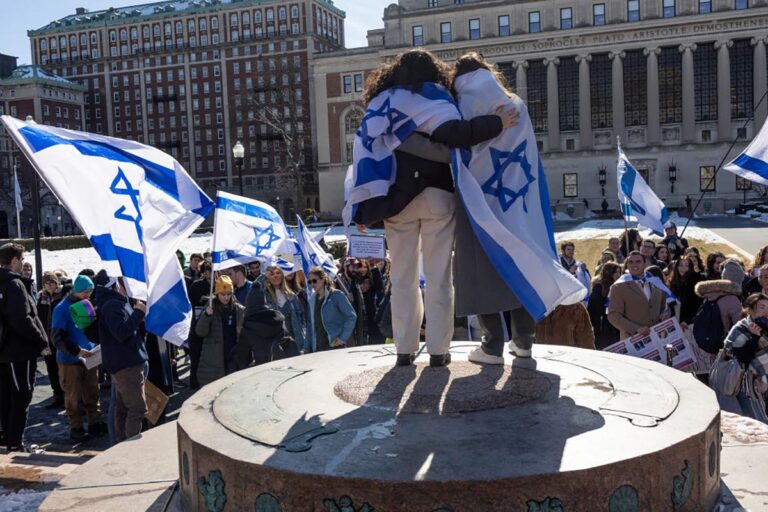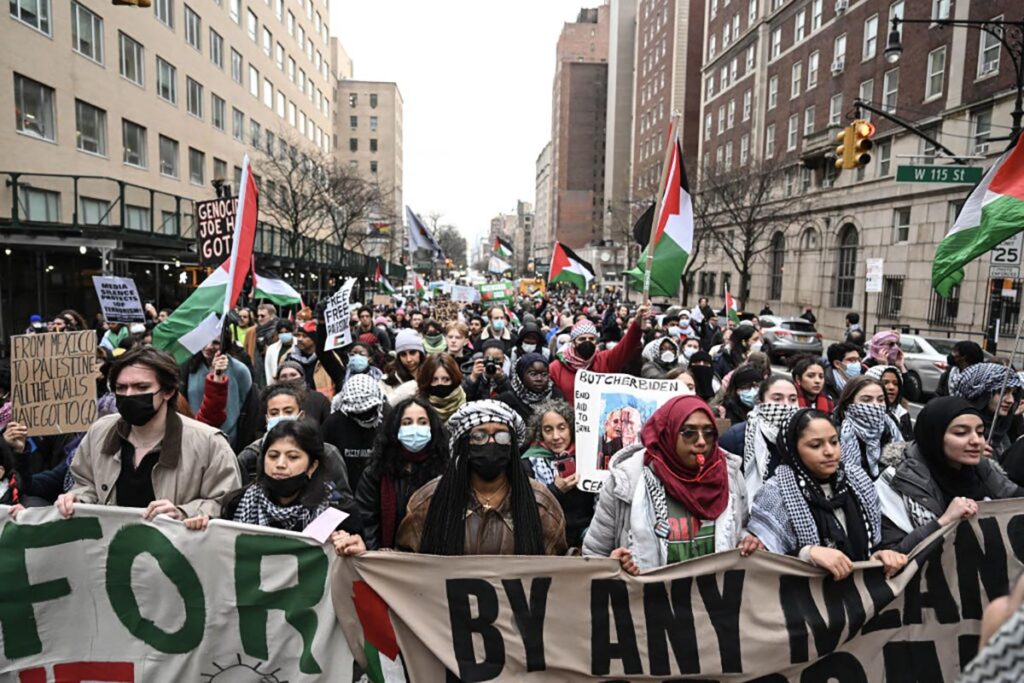
In the weeks after the Oct. 7 attacks, Unpacked asked our college and graduate student readers about the impact of the Israel-Hamas war on their campuses and the reports of increased antisemitism. The responses we received revealed profound feelings of isolation, fear and pain.
Since then, the war in Gaza has led to thousands of Palestinian casualties and 134 hostages still being held captive. Pro-Palestine protests, which are often fiercely anti-Israel, and protests in support of the hostages and Israel, have become weekly occasions on college campuses.

Amid calls for universities to divest from Israel and to create a safer environment for Jewish students, many Jewish college and graduate students feel little hope on their campuses as the situation continue to deteriorate.
Universities like Columbia University, Harvard University and Rutgers University are under fire as Congress attempts to hold universities accountable for enabling the spike in antisemitism.
Students at universities across the U.S. — including Harvard, Penn, MIT, Columbia, the University of California, and Cooper Union — have sued their colleges for failing to protect Jewish students.
As the situation on college campuses continues to unfold and the Israel-Hamas war persists, Unpacked reached out again to our college and graduate student readers to understand how they are grappling with the rising tensions at their schools.

The responses we received, which we share below, represent a collective cry for help and for action during these tumultuous times, highlighting the deepening distress faced by Jewish students on campuses. For each question, read a summary of their responses followed by their answers.
Read more: Lost a friend to antisemitism during the Israel-Hamas War? Here’s what you should know
How have you been feeling about the current situation in Israel and Gaza?
Students expressed a range of emotions, including anxiety, exhaustion, and anger, as they grapple with the impact of the Israel-Hamas war and subsequent increases in antisemitism on their campuses.
“My relatives are fighting in Gaza and my family in Israel is suffering. There has been an insane amount of antisemitism and insanity at my college. That and the doom-scrolling is making me insanely anxious.” — a sophomore at Queens College
“Honestly, I’m exhausted. I feel this weight on my shoulders wherever I go — it’s always there, no matter if I’m actively thinking about the situation or not. Every moment I’m not thinking about antisemitism and the war in general is simply a distraction. I can imagine I’d be enjoying my senior year more if I didn’t live with this constant fear.” — a senior at University of Waterloo
Every moment I’m not thinking about antisemitism and the war in general is simply a distraction. I can imagine I’d be enjoying my senior year more if I didn’t live with this constant fear.” — a senior at University of Waterloo
“Sad and angry, I really want there to be peace.” — a senior at Kutztown University
“Sick to my stomach.” — a graduate student at University of Chicago
“Anxious, scared, angry.” — a sophomore at McGill University
“I always wanted to make aliyah. 10/7 pushed my plans up by 10 years. I’ll be moving to Israel the second my program is over.” — a graduate student at University of Southern California
“I always wanted to make aliyah. 10/7 pushed my plans up by 10 years. I’ll be moving to Israel the second my program is over.” — a graduate student at University of Southern California
“I’m hoping for the safety of my close friend who has not reached out to me since Oct. 7. I am devastated by the events unfolding, I daven every day for the elimination of Hamas and freedom of all hostages.” — a sophomore at Lehman College
“Every day the war goes on, my feelings of safety as a Canadian Jew begin to chip. People will eventually turn on us here too.” — a freshman at the University of Toronto
Have your feelings changed about the situation since Oct. 7 or have they been consistent throughout?
Many students shared whether their feelings about the situation have evolved since Oct. 7, with many reporting that their sentiments have remained consistent or worsened, expressing growing frustration and loss of hope.
“Pretty consistent. Everyone is taking such hard-line stances on either side. Every day, I’m overwhelmed with grief that nothing can solve.” — a junior at University of California, Los Angeles
“Every day I lose a bit more hope. The world continues to turn on Israel more and more.” — a freshman at Pennsylvania State University
“Every day, I’m overwhelmed with grief that nothing can solve.” — a junior at University of California, Los Angeles
“Worse.” — a sophomore at McGill University
“I’m a staunch Zionist, but it gets harder to defend the actions of the Israeli government every day.” — a senior at Barnard College
“Every day I become more certain that Netanyahu has to go. If Israel is to be the moral force in the Middle East, it needs to have a leader willing to look to the future in good faith.” — a junior at New York University
“I’m a staunch Zionist, but it gets harder to defend the actions of the Israeli government every day.” — a senior at Barnard College
“I’ve always stood firmly against antisemitism in every sense of the word; that hasn’t changed and will never change. However, as the situation has gotten more complex, my confidence in my views has become more shaky as I can’t keep up to date with the details of what’s going on. As time goes on, I’ve become more understanding of the many people around me who choose not to get involved at all.” — a senior at the University of Waterloo
Give us a sense of what it’s like to be on your campus right now (how your college administration has responded, how fellow students have responded, student protests, etc.). How does that make you feel?
Students described tense atmospheres on their campuses, instances of hostility, isolation, and lack of support from administrations and fellow students.
“People pick out all the pro-Israel students in classes and refuse to acknowledge us. That doesn’t really bother me because I don’t want to associate with anyone who can’t think critically. It’s only difficult when my classmates look me in the eyes when I pass them protesting or when they glare and whisper during class.” — a senior at New York University
“I’m so alone here. Spring break can’t come quick enough. I just want to go home.” — a senior at Barnard College
“I’m so alone here. Spring break can’t come quick enough. I just want to go home.” — a senior at Barnard College
“It feels like I need to cut off more friends each week. It’s hard feeling like everyone on campus is against me.” — a senior at New York University
“The administration took forever to issue a statement. They have done nothing to stop angry hostile protests; they allow teachers to voice their support for Hamas, allow incessant articles full of lies to be published, allow teachers to bring their opinion into classes that have nothing to do with current events, like selecting a pro-Palestinian book for a class on teaching literacy to children and inviting pro-Palestinian and Jewish Voices for Peace into the same class to speak. I had to drop the class. I’ve received zero support from the department or administration.” — a sophomore at McGill University
“I submitted transfer applications. I cannot wait to leave.” — a sophomore at Harvard University
“I submitted transfer applications. I cannot wait to leave.” — a sophomore at Harvard University
“Every day there’s a protest or calls to boycott Israel. No one is willing to have a conversation with any nuance. You either support Hamas or every action of the Israeli government. Condemning the actions of Hamas makes you anti-Palestinian.” — a junior at New York University
“My roommate has not spoken to me since we came back from winter break because I’m Israeli. She told me she would expose me as an Israeli if I didn’t apologize for identifying with the country that my parents and grandparents were born in. No other [ethnicity] would be asked to apologize.” — a student at Pennsylvania State University
“I am targeted in some of my classes. I had to do a group project alone because no one in my class was willing to work with someone who ‘supports genocide.’ I had to pretend that I wanted to do it by myself. I got points deducted for not being a team player.” — a student at New York University
“My roommate has not spoken to me since we came back from winter break because I’m Israeli.” — a student at Penn State
“I have to hide my Magen David and I’m scared to wear my tichel [headscarf]. I’ve stopped attending shul because some of the students plan protests in front of synagogues and I don’t want to be seen and then targeted at school. I’m sickened that I cannot be myself because it feels like such a stab in the back.” — a sophomore at Lehman College
“As one of the only Jewish people I know at the University of Waterloo, I’ve had to leave several social events in tears because of antisemitic or factually incorrect things I’ve seen or heard from people I thought should know better. But I have found solace in my roommates and the Jewish friends I have from our sister school around the corner.” — a senior at University of Waterloo
“Hillel and Chabad no longer have tables outside of the student union.” — a junior at University of California, Los Angeles
“People just promote conspiracy theories without fact-checking. I’ve asked many of my friends who are anti-Israel why they think there’s a ‘genocide’ in Gaza, and none of them could give me an answer. The virtue signaling from them is exhausting because they have no stake in the conflict and can’t even tell me the basics nor the history.” — a senior at the Ohio State University
“I have to hide my Magen David and I’m scared to wear my tichel [headscarf]. I’ve stopped attending shul because some of the students plan protests in front of synagogues and I don’t want to be seen and then targeted at school.” — a sophomore at Lehman College
“My university president sent out a statement shortly after Oct. 7 that I thought was well written. For the most part, students hated it though and people posted pretty antisemitic things — including cartoons from the 1940s depicting Jews negatively. At our Jewish Student Union Hannukkah event, we surprisingly had a big turnout, but when we had a table at a holiday event required for a participation grade for classes, people did not want to interact with us at all. I feel frustrated but we have a super small community on campus, so there is not a lot that can be done about it. I don’t like how my classmates react when anything Jewish or related to the war is brought up. I have lost some friends and even a relationship due to differing views on the war.” — a senior at Kutztown University
“People will at least tell you they’re antisemitic upfront now. They’re not even veiling it. I was told ‘yeah, I’m antisemitic’ by another NYU guy on Hinge. While that means the situation has only gotten worse, it means I’m able to weed people out more quickly.’” — a junior at New York University
“Simply saying you believe Israel has a right to exist makes you a social pariah at Columbia.” — a senior at Columbia University
Since Oct. 7, would you say the situation has gotten better, gotten worse, or remained the same for Jewish students on your campus?
Many students feel that the situation on their respective campus has worsened since Oct. 7, with increased antisemitism making campus life more challenging for Jewish students.
“Much, much worse.” — Sophomore at McGill University
“Every day, I’m more scared to be on my campus. I’m constantly confronted with videos of Jewish students being targeted, called slurs, harassed.” — a freshman at University of Toronto
“Every day, I’m more scared to be on my campus. I’m constantly confronted with videos of Jewish students being targeted, called slurs, harassed.” — a freshman at University of Toronto
“Since Oct. 7, it’s definitely gotten worse for Jewish students on my university campus. There are more people who are (at least partially) following the situation and more who feel they need to have an opinion about it, so there are more people protesting.” — a senior at University of Waterloo
“Worse, but we’re refusing to hide. I wear my Star of David every day now. That being said, I’m reconsidering doing grad school there.” — a junior at University of California, Los Angeles
“Initially I thought it would be normal and it seemed like it would be for a bit. Then everything just got progressively worse.” — a sophomore at Queens College
“Initially I thought it would be normal and it seemed like it would be for a bit. Then everything just got progressively worse.” — a sophomore at Queens College
“Students have threatened, doxxed and shared literal Nazi-level crooked nose Jew memes of students on campus. Last semester, [Within our Lifetime activist] Anas Shuaib did a khaybar chant in front of some 200 people and he was defended. This semester looks like it’ll be as bad. In the past week, someone posted on a media studies chat that ‘QC is a rats den of zionists. Imma burn em all.’” — a sophomore at Queens College
“Worse is an understatement.” — a freshman at Cornell University
“I went here because I wanted to be at a pro-Israel, Jewish school. The tides tend to be changing and it feels like more students support BDS than Israel now.” — a junior at Brandeis University
Have you noticed sentiments changing on your campus about the Israel-Hamas war in any way?
Respondents noted that sentiments on campus have become more entrenched, with growing polarization and a lack of willingness to engage in nuanced discussions about the Israeli-Palestinian conflict.
“No — there is no support for Israel or Jews except for Jews themselves.” — a sophomore at McGill University
“People seem to be getting more and more set on the side they’ve picked and are unwilling to listen to anything that doesn’t fit into the narrative they’ve created.” — a senior at Kutztown Univerisity
“People seem to be getting more and more set on the side they’ve picked and are unwilling to listen to anything that doesn’t fit into the narrative they’ve created.” — a senior at Kutztown Univerisity
“Sentiments got worse the second Barnard stepped in. By standing up for Jewish students, the anti-Israel protesting has just gotten worse.” — a senior at Barnard College
“No, students have been pretty consistently pro-Palestine the whole time.” — a junior at University of California, Los Angeles
“Everyone with a social media page now believes they’re an expert on a conflict that has been ongoing for centuries. It’s crazy that people who can’t tell you which river and which sea they chant about think they can solve the Israeli-Palestinian conflict.” — a junior at Columbia University
Do you feel like you’re getting enough support? What kind of support do you wish you had?
By and large, students desire more action from their universities, including enforcement of bylaws, interventions from professors, and solidarity from non-Jewish peers to combat feelings of isolation.
“I want bylaws enforced, administrators directing to keep materials out of class unless they are relevant to the curriculum, and not allowing protests that stop students from accessing classrooms.” — a sophomore at McGill Univerity
“I want to be less lonely.” — a junior at Brandeis University
“I want to be less lonely.” — a junior at Brandeis University
“I wish the university would take a stronger stance to support Jewish students on campus. I wish I could feel safe walking around in a kippah.” — a senior at Kutztown University
“Our president has been doing a lot of things, but there are a lot of First Amendment factors he can’t do anything about. He’s doing everything he can to keep us safe.” — a student at Binghamton University.
“All I want is for administrators to stand up for Jewish students and say that harassing them isn’t OK. However, Harvard’s too busy trying to defend plagiarists and pretending that it’s still the best college in the nation. I will never send my kids here.” — a sophomore at Harvard University
“All I want is for administrators to stand up for Jewish students and say that harassing them isn’t OK.” — a sophomore at Harvard University
“I wish professors would step in when certain students bring up the conflict at unnecessary times. I also wish at least someone from my school — a professor, a non-Jewish student, whomever — would check in on me and the other few Jewish students who are still suffering. It perpetually feels like nobody understands what we Jewish students are constantly going through. When we aren’t receiving any messages of support from people at our school, this exacerbates that feeling.” — a senior at University of Waterloo
“The support is there from the organizations around campus that support Jewish life and culture. However, from the administration, nothing.” — a junior at University of Pittsburgh
“I just want to feel like I’m not alone.” — a graduate student at University of Southern California
Read more: Self-care tips when the news gets too overwhelming
Originally Published Mar 17, 2024 10:10PM EDT


